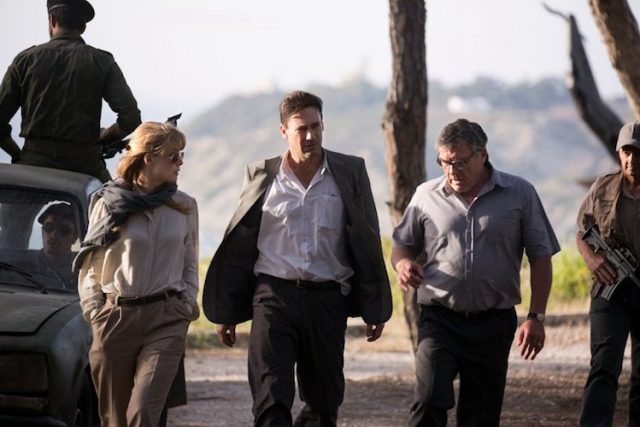
Few actors are better suited to play a diplomat than Jon Hamm, and the erstwhile Don Draper brings his gregarious A-game to “Beirut,” a compelling espionage flick directed by Brad Anderson (“The Machinist,” “Session 9”) and written by Tony Gilroy (“Michael Clayton,” the Jason Bourne series). We first meet Hamm’s glad-handing Mason Skiles in 1972, hosting a successful party in the Lebanese capital (“Christians in one corner, Muslims in the other corner, Jack Daniels in the middle”) that is interrupted by violence in which Mason’s wife is killed. Ten years later, Mason is home in the U.S. working in the private sector as a negotiator, mostly handling union arbitrations and drinking heavily. He’s summoned back to Beirut to negotiate the release of an American hostage taken by the same group responsible for the 1972 incident — and the hostage is Cal Riley (Mark Pellegrino), a friend of Mason’s from whom he has been estranged since then.
Set during what proved to be a temporary ceasefire in the Lebanese Civil War, “Beirut” has the advantage of being a fictional, malleable story with an authentic historical backdrop — realistic, but with Hollywood twists. The kidnappers, led by a young man named Karim (Idir Chender) whom Mason knew when he was a teenager, are demanding the release of Karim’s older brother, a terrorist from the attack at the 1972 Munich Olympics. Mason must negotiate with Israel, the PLO, Karim, and others, and every scene devoted to the give-and-take of diplomacy is electrified by Hamm’s gruff charm. Rosamund Pike brings steely elegance as Mason’s CIA handler, and Dean Norris, Shea Whigham, and Larry Pine are also on hand as State Department officials with varying allegiances and motives, adding to the intrigue.
There’s nothing new here, of course, and Anderson doesn’t seem curious about the complexities of Lebanon. As presented, the story could have been set in any time period during any conflict, though I know Gilroy (who originally wrote the screenplay in 1991) was very interested in Lebanon specifically. But even lacking subtext it’s sturdy, grown-up entertainment that delivers its meat-and-potatoes story without pretense.
B (1 hr., 49 min.; )





